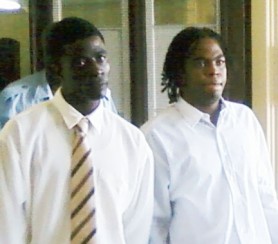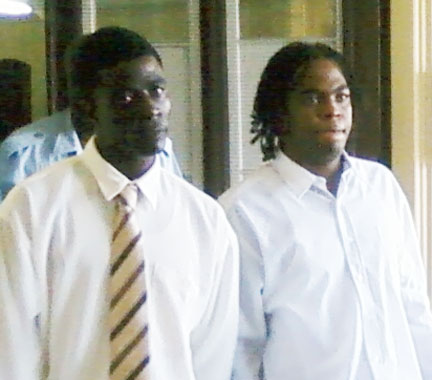Constitutional redress is being sought for murder accused Trion Sumner whose rights were reportedly breached because he was not afforded a fair hearing within a reasonable time.

Attorney Basil Williams on Wednesday filed a motion at the High Court seeking redress, under Article 153 of the Constitution, for the contravention of Sumner’s fundamental rights and freedoms guaranteed by Articles 40, 139 and 144 of the Constitution of the Republic of Guyana.
The application, motion number 15/M of 2010, was filed by Cheryl Sumner on behalf of her son. The respondent in this matter is the Attorney General.
Sumner and Squincy Mc Lennon were accused of murdering Odingo Dingham Bryan in January 2004. Sumner was charged with the murder on February 27, 2004 and appeared at the Vigilance Magistrate’s Court before, then magistrate, Brassington Reynolds the same day. On August 10, 2004 he was jointly charged with Mc Lennon with the murder and the preliminary inquiry (PI) commenced on October 5 the following year before the same magistrate. Mc Lennon was at the time in court over the murder of Anson Melville.
The PI into Bryan’s death was concluded on March 23, 2007 and the two accused were committed to stand trial for murder during the next session of the Demerara Assizes. The trial should have begun since April 2007, an affidavit in support of and attached to the motion stated. However, up to now “no indictment of the offence of murder has been preferred by the DPP [Director of Public Prosecutions] before any Judge of the High Court”. As a result Sumner, as well as his colleague, has been incarcerated for six years.
Basil Williams is seeking redress for his client in the following terms: declarations that Sumner’s right to a fair hearing within a reasonable time has been contravened; and that the failure of the DPP to afford this to Sumner “is an abuse of the process of the Court, and a breach of Article 144”.
The attorney further applied for an order permanently staying the charge of murder again St Sumner. Failing this the application demanded: a declaration that Sumner was denied his personal liberty guaranteed by Article 139 in that he has not been tried in a reasonable time; an order that Sumner be released either unconditionally or with reasonable conditions; an order that he be awarded damages for breach of his rights guaranteed by the aforementioned articles; such further or other order the court deems just and costs.
On January 26, after the DPP’s failure to present the Sumner/Mc Lennon case, the judge ordered that Sumner be admitted to bail in the sum of $300,000.
Prior to this, State Prosecutor Naimalla Ali had told the court in late December, 2009 at Gaol Delivery that the indictment against Sumner would be the first matter on Justice Bovell-Drakes’ list of cases to be preferred.
State Prosecutor Judith Mursalin, on January 12, told the judge that the DPP was unable to present the case because she was unable to locate the main witness Errol Adams. It was then that Justice Bovell-Drakes reminded the state prosecutor that he had noted in October, 2009 at Gaol Delivery that the Sumner/Mc Lennon matter was one of the oldest on the list and ordered that some effort should be made to get it tried.
However, on January 26 instead of presenting the Sumner/Mc Lennon case State Prosecutor Pritima Kissoon preferred another case. Justice Bovell-Drakes had said that the DPP failed to carry out his January 12 order and noted that Kissoon failed to give any legal justification for disobeying his order. He subsequently granted Sumner bail; however, Mc Lennon was not admitted to bail because he has another indictment pending.
The judge’s bail order was later stayed by another order issued by a fellow High Court judge, Justice Diane Insanally. A conservatory order was granted to the DPP on January 29 staying and/or suspending Justice Bovell-Drakes’ decision to grant the accused bail.
Following the granting of the conservatory order Justice Insanally transferred the matter to Bail Court for February 15.

